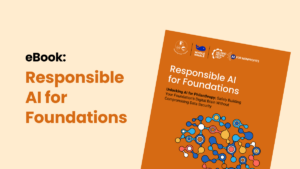We all understand that grantmaking is meaningful. However, it also carries the responsibility to create lasting connections that drive community impact. For funders, that responsibility often brings new challenges in managing the grant process effectively.
As more nonprofits seek external funding, strong grant management becomes essential to keep pace with demand. When done correctly, it ensures every grant cycle strengthens partnerships between funders and the communities they serve.
Why funders’ perspectives matter
Grantmaking is complex, especially when funding supports multiple programs and partners. As a majority of grantseekers anticipate government funding cuts and uncertainty rises, funders need grant management systems strong enough to handle an increase in applications and awarded projects.
From a funder’s perspective, effective grant management isn’t only about distributing dollars. Centralizing policies and board reporting with foundation management software improves transparency and makes it easier to demonstrate accountability to stakeholders.Today, more than half of funders report taking steps to streamline grant applications and reporting processes. Strengthening these core functions is not only essential for efficiency; it also makes it easier for funders to deliver support equitably and build lasting trust with their nonprofit partners.
What nonprofit grant management means for funders
Grant management is the end-to-end process funders use to assess, distribute, and monitor funding across the entire grant lifecycle.
The lifecycle begins with an application.
Once a proposal is submitted, grantmaking staff:
- Review the application to confirm it meets funding requirements
- Approve and disburse funds
- Monitor award progress and track project updates
- Measure and report impact
- Ensure compliance with regulatory requirements
Because the grant lifecycle is a multi-step process, it requires careful attention to detail and a clear view of all in-progress projects. Strong systems help funders manage each stage with confidence and consistency.
Why strong grant management matters
Over half of funders are moving to streamlining their funding processes. To succeed, they need effective grant management systems that provide the structure to make every dollar count.
Strong frameworks:
- Ensure funds are distributed equitably and lead to a measurable impact
- Build trust with grantees, reviewers, staff, and external stakeholders
- Provide transparency that supports compliance and strengthens donor or board relationships
With the right systems in place, and by following a clear grant management checklist, funders strengthen relationships with grantees, improve equity in funding decisions, and ensure resources are directed toward meaningful, lasting outcomes.
The funder’s lens: Core elements of grant management
Each element of the grant management process connects to a stage in the grant lifecycle, from the first application to project completion.
A strong framework includes:
- Application and proposal review: Assess clarity, feasibility, and alignment with your mission and values.
- Due diligence: Evaluate financial health, governance, and organizational capacity.
- Disbursement and tracking: Structure payments, monitor milestones, and adjust as needed. Adopting grant tracking software helps teams monitor milestones, due dates, and deliverables in one place, reducing delays and missed reports.
- Reporting requirements: Collect program outcomes, financial documentation, and lessons learned.
- Ongoing communication: Build stronger relationships through feedback, collaboration, and conversations that extend beyond the funding cycle.
As expectations for transparency rise and more nonprofits turn to outside funding sources, these core elements provide the structure that grantmakers need to maintain reliable and transparent granting practices.
Challenges funders often face
For funders, the grant lifecycle is not always a smooth process.
Grant administration, funding awards, and tracking can present challenges, such as:
- Inconsistent, incomplete, or late reporting from grantees, often tied to grant project management
- Managing a high volume of applications with limited staff capacity
- Relying on outdated technology that slows workflows and limits data visibility
Grantmaking is already a demanding process. Without streamlined processes, there’s an increased risk of delays or errors. Managing these challenges is made easier with grant management software.
Tools that support better outcomes
Modern software for grantmakers streamlines reviews, simplifies applicant communications, and strengthens reporting across the lifecycle.
Funders should look for solutions that offer:
- Grant management tools: Platforms like Foundant’s Grant Management and Scholarship Lifecycle Manager (SLM) simplify workflows for staff, applicants, and reviewers.
- Integrated platforms: When connected with systems like CommunitySuite, funders gain real-time visibility into data and outcomes across programs.
- Key features: Configurable dashboards, reporting templates, compliance tracking, and applicant portals that bring greater efficiency and transparency to the entire lifecycle.
Grant management software helps organizations strengthen partnerships with grantees. It can also help funders extend their reach and amplify meaningful outcomes within their local communities.
Best practices for impactful grant management
While rewarding, grantmaking can quickly become overwhelming without transparent processes and consistent reporting. Following best practices for grant management can alleviate some of these challenges and make grantmaking more impactful for the local community.
Consider:
- Establishing clear guidelines: Make applications, reporting, and communication expectations transparent and accessible
- Automating routine tasks: Use technology to reduce manual work so staff can focus on higher-value, strategic efforts
- Leveraging data-driven insights: Refine processes, improve equity, and maximize the impact of every grant awarded
These best practices make award management more manageable for staff. Following them also provides stakeholders and community partners transparency into how funds are managed and spent, helping to increase trust and move toward creating lasting relationships.
Moving forward with stronger partnerships
Effective grant management ensures accountability, transparency, and stronger relationships that benefit both funders and nonprofits. When done well, it supports the entire grant lifecycle, from the first application to final reporting, with clarity and consistency.
Grant management software streamlines processes and offers intuitive reporting tools. With these tools, funders can reduce errors, save time on reviews and approvals, and quickly see progress at a glance.
Start a conversation with Foundant to explore how our grant management solutions can help your organization simplify administration, strengthen partnerships, and focus more on creating lasting impact.

